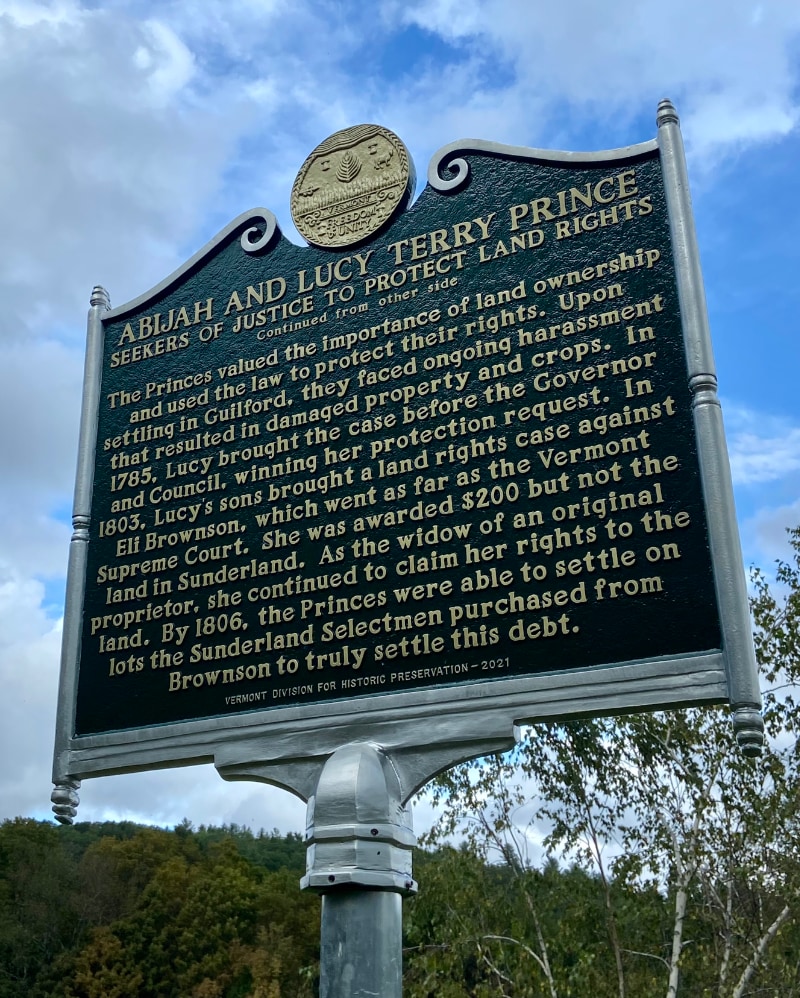Efforts to highlight the life and work of Lucy Terry Prince, the nation’s first known African American poet who lived just south of Brattleboro in nearby Guilford, launched the Words Project; Exploring Lucy’s life and meaning has remained a strong theme of the work ever since.

Shanta Lee, Poet, Writer Multimedia artist and Brattleboro Words Project Advisory Team Member
Shanta Lee spear-headed the Project’s work on Lucy Terry Prince and the Prince family, early Vermont landowners who first came to national prominence through Gretchen Holbrook Gerzina’s (a Marlboro College alum) seminal book: Mr. and Mrs. Prince: How an Extraordinary Eighteenth-Century Family Moved Out of Slavery and Into Legend.
Lee also produced an audio segment and wrote a Print Town chapter on Lucy and has since performed and published (see Lee’s Ms. Magazine piece) widely on her as a speaker for both the Vermont and New Hampshire state humanities councils.
‘Lucy Speaks’ was funded by the Project’s first grant – a National Main Street/ Edward Jones ‘Placemaking on Main Challenge’ secured by then Downtown Brattleboro Alliance Coordinator Jen Austin. 118 Elliot helped by purchasing and outfitting an innovative Mobile, Interactive Literary Exhibition Space - dubbed MILES with a logo created by Erin Maile -- which debuted the exhibit in front of Key Bank at 135 Main Street as part of the 2017 Brattleboro Literary Festival. The Literary Festival has gone on to mount a special local history exhibit each year as part of its partnership with the Brattleboro Words Project.

The Mobile, Interactive Literary Exhibition Space
The Brattleboro Words Project’s first exhibit focused on Lucy and the Princes, curated by Amy Beecher from Marlboro College with assistance from Lee, Jerry Carbone, Sandy Rouse, Lissa Weinmann and Sarah Kovach.
The October 2017 multimedia exhibit called “Lucy Speaks’ featured performances by Shanta Lee and Marlboro College students, a first-ever graphic timeline of her life and an evocative, haunting video shot by John Loggia at Abijah Prince Road.
Shanta Lee reciting Lucy Terry Prince's 'Bars Fight' on Abijah Prince Road

Upon securing unanimous support from the Guilford Historical Society and Guilford Selectboard, Lee led the Brattleboro Words Project effort to place a state roadside historic marker for Abijah and Lucy Terry Prince at the state Guilford Welcome Center off I91, often considered the ‘gateway to Vermont’ from points south, so that all the visitors to Vermont would know that African Americans helped found and shape the state from its very beginnings.
Including this site as part of the Brattleboro Words Trail also extended the state-wide African American Heritage Trail southward to be the first, most southerly site on that Trail. Guilford State Representative Sara Coffey helped secure enactment of a state resolution R.97 in 2021 recognizing Lucy Terry Princes’ contributions.
Click above to watch a 7 minute video.
(front) Abijah and Lucy Terry Prince
Early Landowners and First Known African American Poet
Abijah Prince (c. 1706-94) served in the French & Indian Wars, as a slave and freedman. In 1751, he achieved his freedom and registered as a taxpayer and proprietor for land ownership.
Lucy Terry (c. 1730-1821) was stolen from Africa as a child and enslaved in Deerfield, MA. Her only surviving poem “Bars Fight” records the 1746 attack on Deerfield settlers. The singsong ballad, the earliest existing poem by an African American, endured in oral tradition for over 100 years before appearing on the front page of the Springfield Daily Republican in 1854.
Lucy became free sometime after they married in 1756. In 1769 they began settling 100 acres in Guilford.


Crowd gathers around new Lucy Terry Prince sign unveiling at I91 Exit One (northbound) Welcome Center. October 2021.
( back ) Seekers of Justice to Protect Land Rights
The Princes valued the importance of land ownership and used the law to protect their rights. Upon settling in Guilford, they faced ongoing harassment that resulted in damaged property and crops. In 1785, Lucy brought the case before the Governor and Council, winning her protection request.
In 1803, Lucy’s sons brought a land rights case against Eli Brownson, which went as far as the Vermont Supreme Court. She was awarded $200 but not the land in Sunderland. As the widow of an original proprietor, she continued to claim her rights to the land. By 1806, the Princes were able to settle on lots the Sunderland Selectmen purchased from Brownson to truly settle this debt.